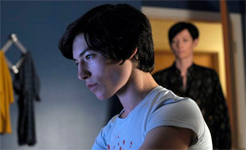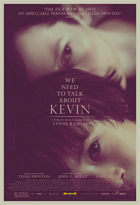We Need to Talk About Kevin
|  Lynne Ramsay’s We Need to Talk About Kevin is the second film this year to deal with the aftermath of an adolescent boy’s massacre of his fellow students, but it differs sharply from Shawn Ku’s Beautiful Boy, which was more of a straightforward psychological drama. We Need to Talk About Kevin, which was based on the 2003 novel by Lionel Shriver, is more of a horror film; temporally fragmented and filmed in such a way that immediately brings to mind paradoxical descriptions like “terribly beautiful,” it cuts back and forth between the present and the past but always with a focus on the seething malevolence of the title character about whom there is much to be said but almost nothing to understand. Lynne Ramsay’s We Need to Talk About Kevin is the second film this year to deal with the aftermath of an adolescent boy’s massacre of his fellow students, but it differs sharply from Shawn Ku’s Beautiful Boy, which was more of a straightforward psychological drama. We Need to Talk About Kevin, which was based on the 2003 novel by Lionel Shriver, is more of a horror film; temporally fragmented and filmed in such a way that immediately brings to mind paradoxical descriptions like “terribly beautiful,” it cuts back and forth between the present and the past but always with a focus on the seething malevolence of the title character about whom there is much to be said but almost nothing to understand.The film begins with a classic image of potential horror: the camera tracking slowly toward semi-translucent curtains billowing in front of an open door at night, the sound of what appear to be water sprinklers growing steadily louder as we get closer. The host of questions that arise from this single image--Where are we? Why are the doors open? Did someone break in? Break out? What is just beyond them that we can’t see yet?--are indicative of Ramsay’s approach to the material, which involves doling out narrative information in partial, sometimes confusing, but always emotionally expressive fragments that we must piece together and make sense of ourselves. Knowing that violence will erupt at some point haunts everything that transpires, making the mundane seem ominous and the overtly menacing downright horrific. Hence, the curtains, which we know will eventually reveal something very, very bad. The central character is Eva Khatchadourian (Tilda Swinton), the mother of Kevin who we first meet at a particularly low point in her life. She is living alone, jobless, and generally numbing her emotional pain with wine and pills in a tiny house that someone has splattered angrily with red paint. After she finds a silver living in getting a job doing secretarial work at a travel agency, a woman we have never met verbally assaults her and slaps her face. These events are contrasted with scattered flashbacks from the previous 20 years. We see gauzy, idealized scenes of her courtship with her husband, Franklin (John C. Reilly), which give way to marriage and motherhood with the birth of Kevin, both of which Eva is not entirely sure she wants (a successful travel writer, she is an urbanite who resists moving out of New York City). Whatever reticence she feels toward settling down as a wife and mother are infinitely compounded by Kevin, who spends the first year of his life screaming constantly (at one point Eva parks herself and Kevin’s stroller next to a construction site just to drown out the noise). Once he stops screaming, he refuses to speak except in self-created gibberish, and her fears that he might be autistic are slowly replaced by the growing realization that, for reasons unknown, Kevin seems to hate her--not just hate her, in fact, but actively despise her. All children misbehave, often willfully, but few glare at their mothers with the kind of seething rage that Kevin displays toward Eva, a behavior that is even more disturbing when we see how he contains it when Franklin is around, playing the “good son” in such a way that is guaranteed to eventually drive the parents apart. As a teenager (played by Ezra Miller), Kevin evinces the outward behaviors of a surly adolescent, except when he’s with Eva, at which time he becomes frighteningly articulate in mocking any attempt she makes to be a mother. The glare and the hatred behind it only increases, and its consistency moves We Need to Talk About Kevin from any kind of psychological drama into the realm of maternal horror. One imagines that even Rosemary’s Baby had a better disposition and attitude toward the woman who birthed him. Working with cinematographer Seamus McGarvey (Atonement), Ramsay ensures that every frame of We Need to Talk About Kevin is both beautifully rendered and dripping with either ominous overtones or pitch-black irony. Ramsay has a way with images and their juxtaposition, which she establishes immediately with a cut from the billowing curtains to an extreme high angle of the annual La Tomatina tomato fight in Spain, which takes on a nightmarish quality in which tomato juice looks more like blood and the slow-motion revelry of the participants feels claustrophobic and menacing. Special mention also needs to be made of the sound design and editing, which makes the ordinary sounds of the everyday world deeply unsettling, if not downright grating, and also finds consistently interesting ways to bridge the past and present via linked images and sounds (Kevin screaming and the sound of Eva using a sander to take the red paint off her house, for example). Ramsay, who began her career as a still photographer, made an indelible impression with her feature debut, Ratcatcher (1999), which was set in the slums of Glasgow in the early 1970s. She displays a knack for finding beauty in filth and also for working with young actors. Interestingly enough, Ratcatcher plays as a distinct counterpoint to We Need to Talk About Kevin, as it emphasizes feelings of guilt in its adolescent protagonist while Kevin is nothing short of a budding sociopath, his sense of interpersonal malevolence untainted by even the slightest hint of human feeling. And that is either the film’s greatest failing (if you want to see it as a psychological drama) or its chief asset (if you want to see it as a horror film). Perhaps in Shriver’s novel (unread by me) Kevin was more multi-dimensional, but here he is simply evil. Thus, his eventual act of violence (which is unknowingly foreshadowed to us in numerous ways, starting with Eva reading him a Robin Hood storybook as a child) is not so much shocking or sad as it is the inevitable climax of a twisted soul’s maturation. Not even Stanley Kubrick had Alex in A Clockwork Orange (1971) glare from beneath arched brows as often as Kevin does, and from a horror standpoint, it is grandly unnerving. It also helps us empathize with Eva, who Tilda Swinton plays as a confused woman turned neurotic by the events in her life. She displays elements of strength in some of the flashbacks before she and Franklin were married, but her primary characteristics seem to be thinness and fragility, and we wonder how she is holding anything together anymore. Her marriage to Franklin doesn’t really make much sense within the film, and John C. Reilly, a good actor, seems terribly miscast; he and Swinton look absurd together, and it’s hard to believe they would have fallen in love and gotten married. Yet, because they share the screen together so little, it never detracts from the film’s growing horror that not even evil itself can answer the question “Why?” Copyright ©2011 James Kendrick Thoughts? E-mail James Kendrick All images copyright © Oscilloscope Pictures |
Overall Rating: 


 (3.5)
(3.5)


